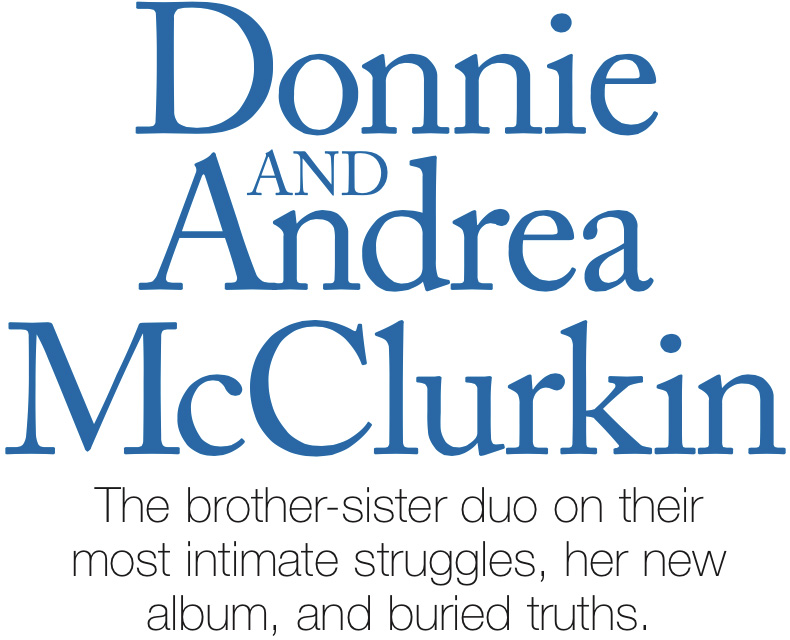
BY MARSHA DUCILLE
If you don’t like the truth ... especially when it makes you feel slightly uncomfortable, you should stop reading. This interview isn’t for you. I don’t know what led gospel music legend Donnie McClurkin and his sister, Andrea, to be so transparent. But the journalist in me was beyond ecstatic. When I left New York City and returned home, I kept waiting for a phone call. Surely, someone would contact me with a list of withdrawn statements.
The McClurkin family is no stranger to controversy. In 2001, Donnie stunned the world with his memoir, Eternal Victim, Eternal Victor. For gay activists, it was nothing short of scandalous. The book revealed that, as a child, Donnie was sexually abused by male relatives – and he believed that the abuse triggered his ongoing struggle with homosexuality. To add fuel to that fire, the three-time Grammy Award-winning artist told the media that he walked away from his gay lifestyle – because being gay was a sin. Questions (and attacks) infiltrated nearly every interview that followed.

My interview was simply slated to cover Andrea’s new (and quite moving) album, Higher. But, playful banter between Donnie and his sister led to unexpected admissions ... and unexpected admissions led to buried truths ... and buried truths led to an impromptu therapy session. Yet, there was no phone call – and there were no retracted statements. Every naked truth and intimate confession remained on the record.
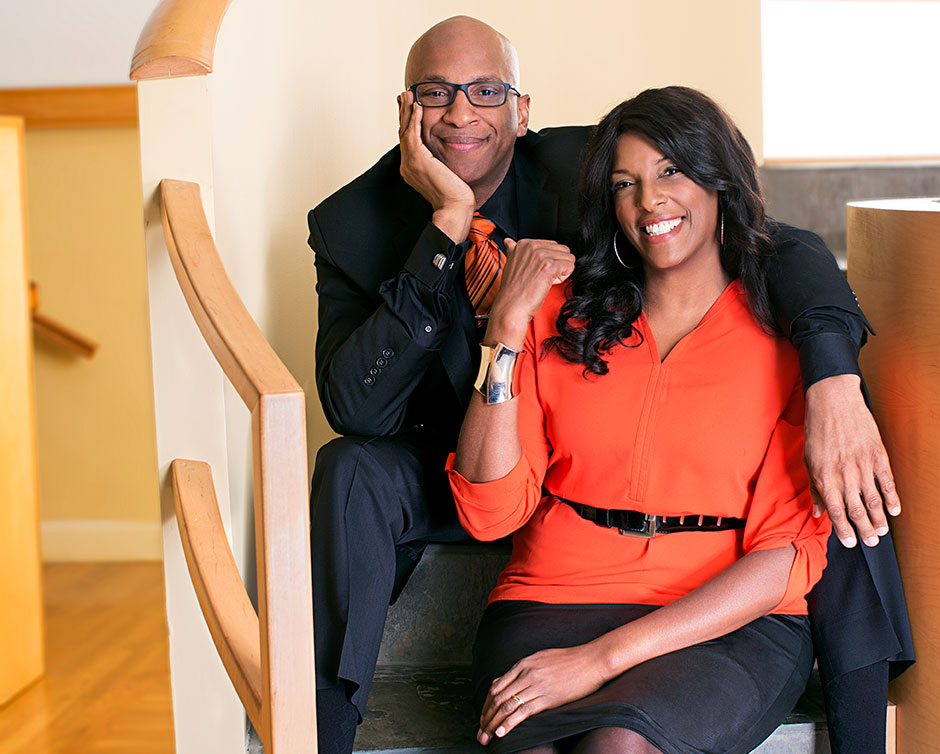
PLAYFUL BANTER
Marsha DuCille [to Donnie]: Give me three adjectives to describe your sister, Andrea.
Donnie McClurkin: I would say, graceful ... talented ... my favorite soprano in the whole world.
MD: And, Andrea, for your brother?
Andrea McClurkin-Mellini: Oh, gosh. [she laughs]
DM: Our family is not used to saying the sentimental things. It would be like, “idiot”...
AM [laughing a bit harder]: Yeah, those are the types of things we’d say. So I’m trying to reach into the “Marcia Brady.” Ummm ... I would say, he’s giving...
DM: Always.
AM: He is very loving.
DM: Very.
AM: And he’s pretty much an idiot. [she laughs, again] The third one would be ...
DM: Marrrrrvelous.
AM: And ... caring. He’s very caring. He’s all those things.
DM: And humble.
AM: No, no. I didn’t say that. He’s all those things that I listed, because he pretty much puts his money where his mouth is. And if we’re in need, he always jumps in and tries to save us. You know, whether it’s a word to bring you back to center – or whatever it is – he’s always there.
MD: Is it difficult to have a brother who’s so outgoing – who’s constantly the center of attention?
AM: No, because I’m pretty much used to it. Ever since I was a teen, I’ve always been “Donnie’s sister.” I’ve never had a name, identity, or anything.
DM: That’s not exactly true, because she’s not just “Donnie’s sister.” Honestly, without being sentimental, right now, everyone in the gospel music arena knows Andrea as a quintessential soprano. She’s got a quality like nobody else in music. Her voice cuts through.
MD [to Donnie]: With so many artists out there, what do you think Andrea brings to the music industry that’s not already there?
DM: Andrea is like a mono-gene. She’s one of a kind. You can listen to every and anybody throughout gospel music history, and you’ll never find a voice that sounds anything remotely close to Andrea’s – and I’m not just saying this for interview-sake. Her quality, her control, her flexibility. She has an endless range (which she’s afraid to use), and she has a trill to her voice. It’s signature. That’s what she brings. That’s the reason why she’s been key in almost everything that I’ve done. She travels the world with me. She really – honest to God – no joke – loves God. I don’t have to worry about anything [regarding] Andrea’s character.
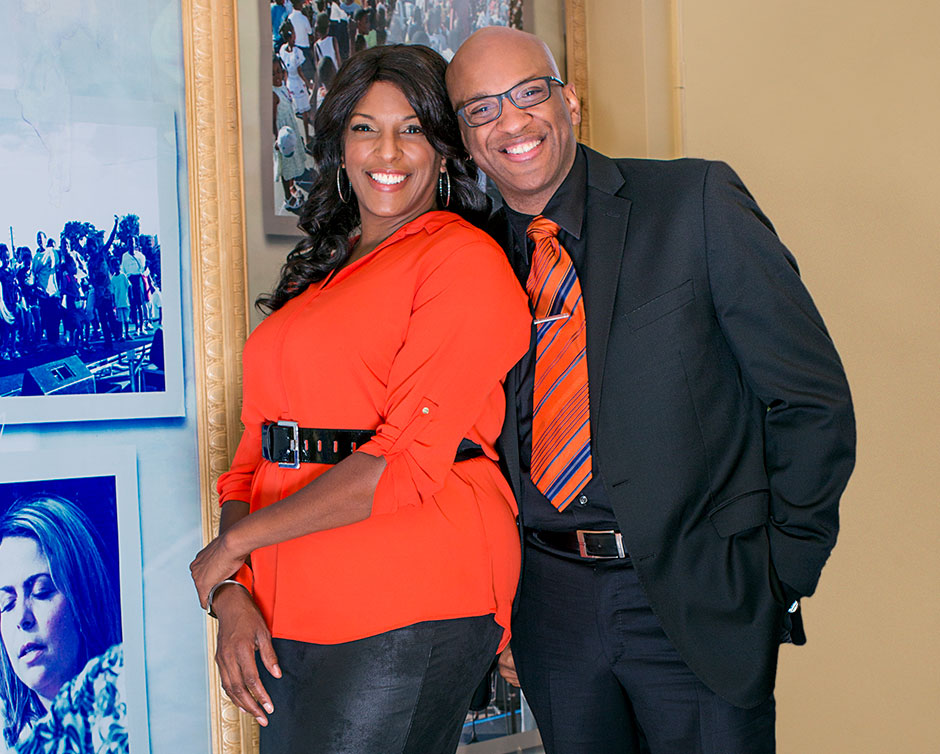
UNEXPECTED ADMISSIONS
MD [to Andrea]: You made a lot of sacrifices to be a part of Donnie’s ministry, here, in New York. Tell us the story behind that?
AM: It was divinely planned. [My husband, Louis, and I] would come to New York periodically for concerts, or whatever, and I would spend time with my family at my mother’s house...
DM [loudly interrupting]: When they would let them, because her husband is white. And my mother didn’t like her husband, initially!
AM [trying to speak over Donnie]: And I would always say...
DM [overpowering Andrea’s voice]: My mother and my grandmother didn’t like him, because you know what they say: “It’s only a matter of time before they call you the N-word.” They didn’t like him at all!
AM: That is sooooo not the story!
DM: But it is so true!
AM: But it has nothing to do with anything.
DM: But we’re talking about divine ...
MD [interrupting the chaos]: Okay, wait a minute! Is this true?
AM: Oh, my God!
DM: Pastor [Marvin] Winans had to go into my mother’s room and say, “Get up, and get to your daughter’s wedding!”
AM: What difference does this make? ... Okay, let me give you the Reader’s Digest: When my husband and I first got together, my family was not happy. A certain amount of people in my family were not happy.
DM [speaking over Andrea]: Militant blacks!
AM: As time went by, they all figured out that he was a great guy. This is where we are today. Amen? [Andrea looks at Donnie] Now, shut up!
DM: I’m gonna make her famous!
AM: So, my Holy Ghost story isn’t good enough?
DM: It is good enough.
AM: It has to be like reality TV? [everyone in the room laughs] Stick to the script!
DM: There is no script.

BACK ON TRACK
MD: Okay, Andrea. Let’s talk about your new album, Higher. You stated in various media outlets that it’s about personal heartache. What heartache were you referring to?
AM: Well, there’s one song called ...ugh ... [she looks at Donnie] What’s the name of the song?
DM: You see, that means she made it up. [Marsha laughs]
AM: The name of the song is “He is Good.” I started writing the song before my sister passed away in 2008 of breast cancer. There is a line that says, “Even if I lose a loved one.” It basically just says that God is good, and no matter what you go through, His mercy endures forever. The song said, “Even if I lose a loved one,” but when my sister passed, I had to change it to “Even when I lose a loved one.”
MD: Oh, wow.
AM: Yeah. And a year later, when we went to Italy as a family, my mom had a seizure and she had to stay in the hospital. She had blood clots in her lungs. That’s when I wrote the chorus. Fast forward to when my mom passed away, I was able to sing the song at her service. So, that song was born out of the sickness and loss of family members.
MD [speaking to Andrea]: Tell me about family. Clearly, you and Donnie have an interesting relationship. How would you describe your relationship with him?
AM: You know, when we were younger, I wanted to poison him. [Andrea laughs]
DM: She poured salt in our beds!
AM [playfully yelling at Donnie]: Can you be quiet?!? Can I ever have some ... What? Are you jealous that the limelight is not on you alone – that there’s actually someone you have to share this time with? [everyone in the room, including Donnie and Andrea, laughs]
DM: No, but with what you said about “poison,” I just want to tell them ...
AM [interrupting]: Just be quiet!
MD: This playful relationship that you have with each other, was it always like that?
DM: Yeah.
AM: Yeah. When I was a teenager, he made me sing with him. I wasn’t really a singer. I was just going with the flow. Back then I had no self-esteem. I had nothing. He kinda dragged me out. We would stick together. When we were 17, 18, 19, we were always together. When you saw him, you absolutely saw me. So, we kinda had this special bond.

MD: So, how can a family with so much love struggle with loving another race?
AM: You know, I don’t know.
DM: Ignorance.
AM: There was my sister, Marlene, who was like the “Angela Davis” [a radical social activist] of our family. And my sister, Olivia, whose first and last statement was, “How you denying your race?”
MD: She said that before she died?
AM: No, no, no. [Donnie and Andrea laugh]
MD: You said her “first and last statement” ... so, I thought, “You better pray for her soul!” [everyone laughs]
AM: No, I meant, that was the only thing she ever had to say about my [interracial] marriage.
DM: Initially.
MD: And how did things change? When did the change happen?
AM: I’m going to tell you how I got my sister, Marlene, to change. Before Louis and I got married – when there was no social media, video phones, and the whole deal – we were doing a show together (Don’t Get God Started), and we had a break ...
DM [interrupting]: Broadway.
AM: Yeah, we had a break. Louis went home, and I went home. He sent me a videotape that he did at his house. I got it in the mail, sat, and watched it. And after it was over, my sister Marlene – who’s like the “Black power” – said, “He sold me!”
MD: What was on the video?
AM: It was just, “Hey, how are you? I miss you.”
MD: So, your family saw that you genuinely loved each other?
AM: Yeah.
MD: And that made them accept him?
AM: That made one of them accept him.
MD: And, Donnie, what was your reaction to all of this?
DM: Louis is a loveable guy. My sister loves him, and he treats her well. They’ve been together for 27 years, and he still treats Andrea the same way that he treated her when they dated. This is the first time in the history of our family that a marriage has been so genuine, so real ... that it hasn’t ended in a divorce. Both of them come from broken homes, but they’ve broken every curse ... and brought integrity back to our family.
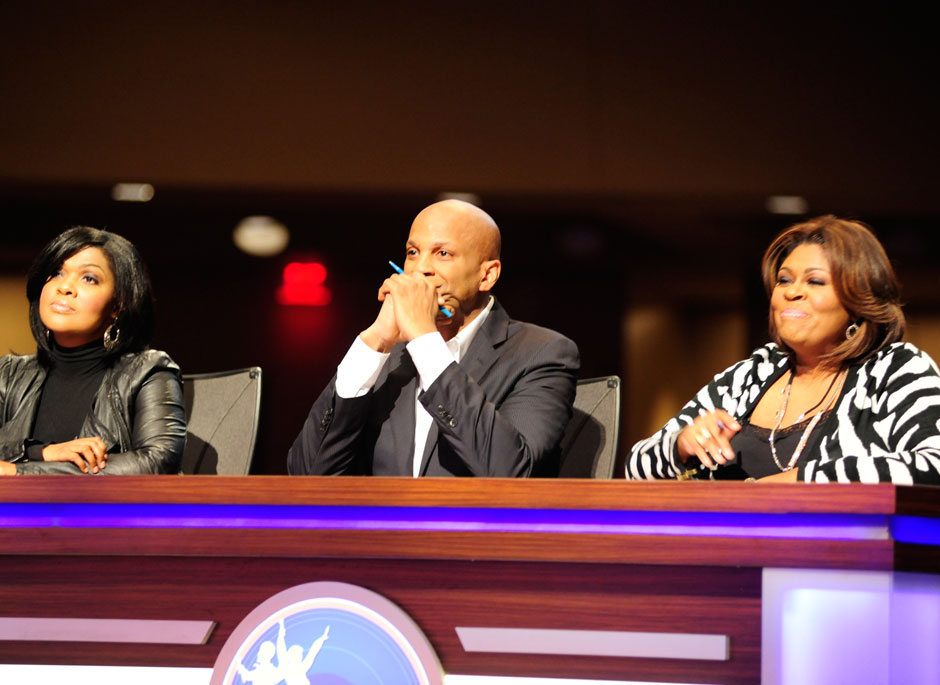
BURIED TRUTHS
MD: When it comes to racism, are Christian music artists more progressive? Are they less racist?
DM: No.
AM: No.
MD: Why do you say, “No”? What do you mean?
AM: Donnie’s been in it longer ... but if I were to give you my take on it...you have the “CCM”[Contemporary Christian Music] and you have the “gospel.” And never the two shall meet! Some people cross over – like CeCe [Winans]. But you can’t really go in and out. [Gospel artists] can’t go on a CCM show.
MD: Why is that?
DM: Racism.
MD: What does that mean?
DM: Racism is simply this: We haven’t yet come to grasp with the fact that we’ve compartmentalized ourselves, and institutionalized racism in the Christian world. There are CCM radio stations that will never play anything that is “urban gospel.” They call us “urban gospel” – which is an insult!
MD: Why is that an insult?
DM: Just because we’re black, that means we’re all urban?
MD: Hmmmm. Interesting.
DM: So, they’ve relegated every black [music] ministry to “urbana” – while they ’re “suburb.” That’s insulting. On [CCM] award shows, they have only one segment for urban gospel. We don’t sing with any of the white artists. Our music is not played on the white stations. We’ll outsell them by far, but we can’t get any of our music played on [CCM] stations?!? We’re not involved in their festivals ...
AM [interrupting]: Yeah. When they did GMA [Gospel Music Awards], you were hard pressed to find any gospel artists that weekend.
DM: There are two or three black artists that are...
AM: Yeah, the “CeCe Winanses” and the “Kirk Franklins.”
DM: But that’s it! And we [blacks] did reverse discrimination. The GMA’s and the Dove Awards had very few black people, so Don Jackson started the Stellar Awards – because we didn’t have an award for ourselves. And whites weren’t honoring us, but we wound up doing the very same thing: The Stellar Awards is an exclusively black award show.
MD: And do you have a problem with that, too?
DM: I have a problem with all of it, because I’m friends with the CCM artists. I’m friends with the “Toby Macs,” and the “Mac Powells.” I’m friends with them, but we can’t sing together.
MD: Have you every discussed this among yourselves?
DM: Yes. We’ve been promising each other for decades, “We’re going to work together! We’re going to work together!”
MD: Well, why hasn’t it happened?
DM: Because we know what will happen if we do.
MD: What will happen?
DM: There won’t be any air-play [on the radio].
MD: You think?
DM: We know.
MD: But isn’t that what happens in the pop world – country singers and rap artists come together, and make a hit? Why does it work there, but it doesn’t work in Christian music?
DM: We’ve tried. Toby and Kirk did something together, but it didn’t get much air-play.
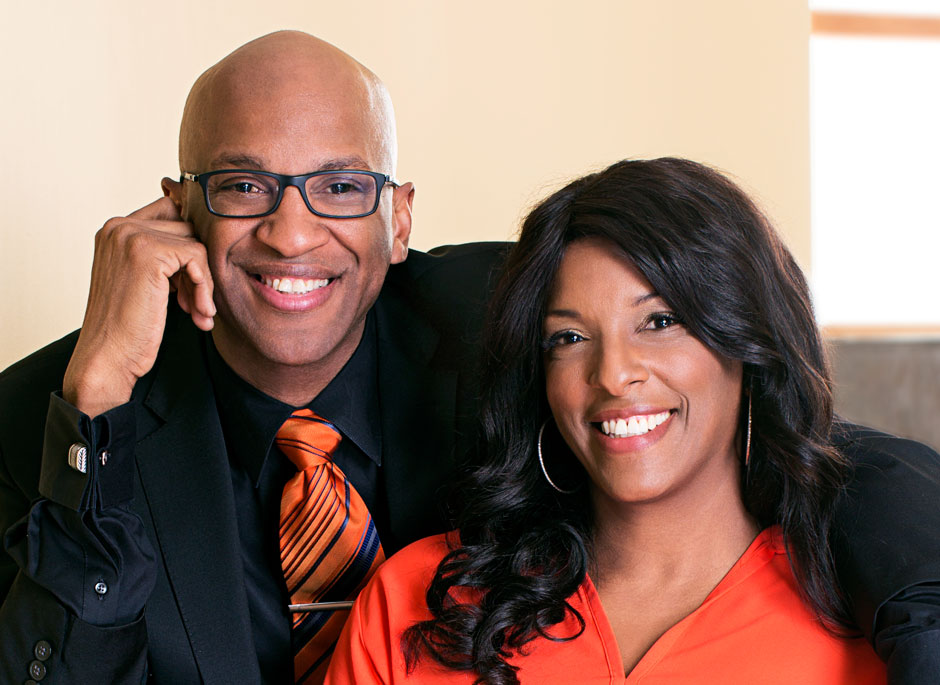
IMPROMPTU THERAPY
MD [to Andrea]: You mentioned that you struggled with insecurity – transitioning from singing in the background to being in the forefront. That seems a bit odd to me, because it takes a lot of guts to commit your life to a man who your family doesn’t like. [Andrea smiles, and Donnie nods]. So, why is a part of you so bold, and another part so insecure?
AM: I just recently had to talk to the Lord about measuring myself against everyone in the music industry – like the Erica Campbells,” the “Kim Burells,” the “Yolanda Adamses,” the “CeCe Winanses,” or whoever else is out there. The Lord had to kinda minister to me that “I’ve given you this assignment. Everyone has their job. Everyone has their place, and this is your assignment. You don’t need to measure yourself against anyone, because you’re you.” The Lord has really been walking me through every instance, and it behooves me to take the lesson.
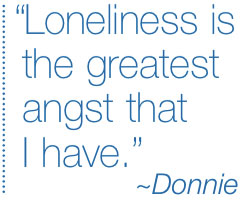 MD: And this is an ongoing lesson?
MD: And this is an ongoing lesson?
AM: Yes, it’s ongoing. Absolutely.
MD: [To Donnie] Do you ever feel insecure at this point in your career?
DM: Always.
MD: Really? Now? Even though you’re a living gospel legend?
DM: It’s just a part of the broken cycle of a person. A lot of things we do, and a lot of things we achieve, we use them as a mask. We use them to finally be something.
MD: That’s deep, and very true.
DM: But when you’re finished parading it before people, you have to go home with you. The broken side is constantly in need of God to heal it. Mine is: I’ve never been married ... and I had a child out of wedlock.
MD: Matthew?
DM: Yes. And not being able to raise him the way Andrea raised her three children – not being able to raise him on your chest, and see him grow up into the child he is now, just seeing him in spurts – those are broken things that don’t heal. I’ve struggled with many different aspects of fear ... and loneliness. Loneliness is the greatest angst that I have.
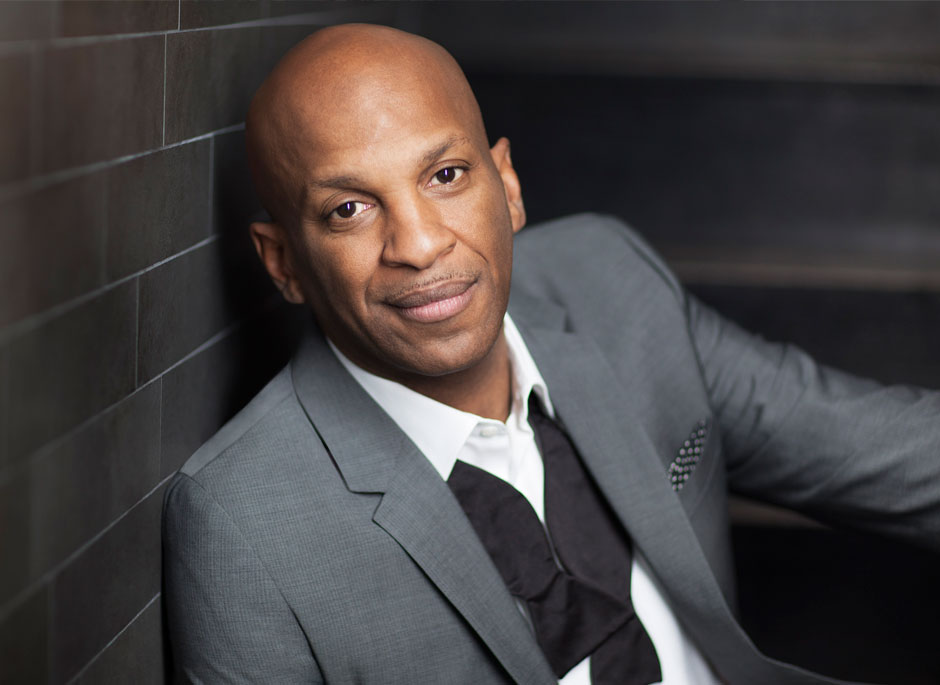
MD: Are you saying that you still desire to be married?
DM: I’m giving up on it more and more.
MD: Really?
DM: Honest. I’m giving up on it more and more, because I’m 55, and there are no prospects.
MD: You must meet tons of women. How can there be no prospects?
DM: You know, if you went outside, you could meet tons of men right now.
MD: So, what are you looking for? What have you not seen that you desire?
DM: Right now, it’s not that.
MD: What is it?
DM: It’s fear. It’s not that I haven’t found the woman that’s right. It’s fear. It’s not them; it’s me.
MD: Fear of what?
DM: Fear of a failed marriage. Fear of hurting a woman with my past. Fear that someone won’t love you for who you are, because of the past relationships that you’ve had ... the relationships that turned into cream cheese in front of you. [Donnie laughs]
MD: Do you mean your past relationships with men?
DM: Yes. That’s one of the fear factors. There are so many different fears.
AM: This is a therapy session! [Everyone laughs]
DM: Exactly.
MD: I’m loving it! So, Donnie, how do you conquer those fears?
DM: That’s just it. I’ve taken all of my energies and put them into preaching, singing, pastoring, and ministering around the world – helping other people out – because I’m secure in that. This is what succeeds. This is what is accomplished. This doesn’t hurt me. This doesn’t judge me. I can absolutely be great in this. So, I live here.
MD: So, the fear of being hurt, the fear of someone judging your past, the fear of someone not loving you for who you are – those fears are strong enough to keep you in an emotional prison?
DM: Yeah, because I don’t live there. I live in the world where I’m successful. My family will tell you, I’m hardly ever home. If I’m home seven or eight days a month, it’s a vacation. Because I live in the world where I have success – where I have security.
AM: Yeah, but it’s a little bit of escapism.
DM: No, it’s not “a little bit of.” It’s absolutely escapism! But, listen, I’ve built this world so much, it’s not like...
MD [finishing Donnie’s statement]: It’s not like you’re in a small closet. You’ve built it large enough to exist there. But, Pastor Donnie, you help people come out of their prisons every day.
DM: Sure do.
MD: Well, don’t you feel an obligation to get out of yours?
AM: I believe that we’re a product of our past.
MD [to Donnie]: Have you been hurt too many times?
DM: Yes. I’ve been hurt by too many people. But it’s not just that I’ve been hurt – I’ve been hurt, and I’ve hurt. I guess there’s a subconscious feeling of penance. You gotta look back and think about the hearts you’ve broken.
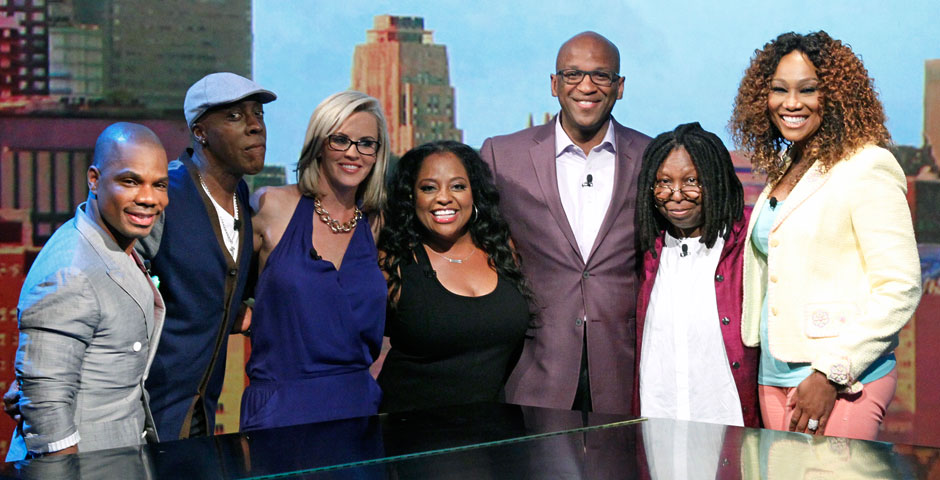
MD: So, you’re serving time?
DM: Well, in a way. I’ve forgiven myself a lot, but it doesn’t show in this area. I’m free spiritually, and in the majority of things, naturally. But the social area of relationships is the one area that I continue to struggle.
MD: [to Donnie] Do you regret writing your memoir, Eternal Victim, Eternal Victor.
DM: No. I’m about to add to it. It was a surface book. My mother has passed now. My dad has passed now. There was a lot that I couldn’t put out because they were still alive.
MD: You’re willing to put out more – even with the backlash that followed? You can’t even have an interview without people bringing up ...
DM [finishing Marsha’s statement]: Homosexuality.
MD: And you don’t regret that?
DM: No. No, I don’t. Not at all.
MD: But you don’t answer questions about it anymore.
DM: Most people only ask questions because they want to be antagonistic. If they were really asking because they wanted to know my testimony, I would tell them. But you have to discern people, and what their motive is behind the question. But for the most part, I never regret it. To this day, I’ve got kids coming to me (transvestite children, homosexual youth, and adults) that come to me – just to talk. They would never have come to me before. “John Q. Public” is looking for someone who they can ask: “Oh my God! Can I talk to you about it, because I never wanted to be like this?”
MD: What do Christians need to understand about loving people who are gay?
DM: They need to understand that ministry is ministry, no matter who it is. We can’t compartmentalize ministry. There are 7.2 billion people on this earth, and every one of them needs Jesus. And we should minister the way that Jesus ministered – through love. Jesus dealt with people that the religious community wouldn’t deal with at all. I wrote a song that says, “What if people never change, will you love them just the same? Have we really learned how to love, just love?”
MD [to Andrea]: As a protective sister, does Donnie’s transparency ever worry you?
AM: No, because it’s his truth. We are overcome by the blood of the lamb, and the word of our testimony. If Donnie’s [journey] helps someone who is struggling, we need someone out there sharing it. We need someone who speaks up. We all have the residue of our past. But, with the help of the Lord, we’re able to overcome it. For me, I’m still insecure, I’m still afraid, and my self- esteem is still pretty shot. But before I go out on stage – before I speak a word – before I encourage someone else, the Lord gives me the strength to get past every negative thing that’s in me. We’re all broken in our own different way, and none of us can heal if we pretend ... if we’re not honest. ![]()